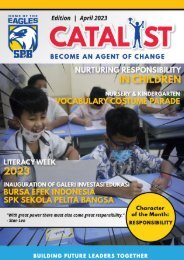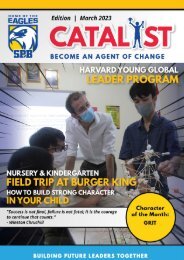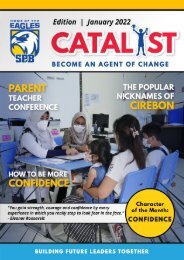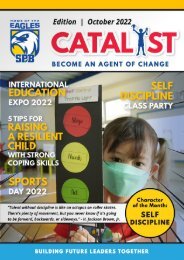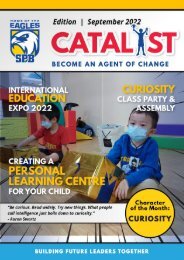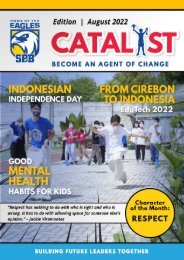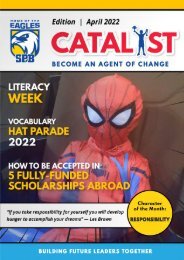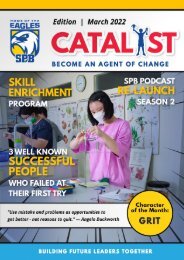CATALYST | July 2022
Monthly insight of student and teacher activities at SPK Sekolah Pelita Bangsa Cirebon
Monthly insight of student and teacher activities at SPK Sekolah Pelita Bangsa Cirebon
You also want an ePaper? Increase the reach of your titles
YUMPU automatically turns print PDFs into web optimized ePapers that Google loves.
CONTENTS<br />
Principal's Message<br />
Orientation Week <strong>2022</strong>-2023<br />
Let's Share Kindness!<br />
Growth Mindset in Orientation<br />
Students' Achievement<br />
Parent Teacher Conference<br />
Professional Development<br />
2<br />
5<br />
6<br />
7<br />
14<br />
15<br />
Welcome to the new academic year,<br />
<strong>2022</strong>-2023.<br />
I would like to take this time to welcome<br />
all new families who first joined Sekolah<br />
Pelita Bangsa in this academic year, and<br />
welcome back all returning students to<br />
another great year.<br />
Despite all the detailed and timeconsuming<br />
preparations of conducting<br />
full offline learning, we are thrilled to<br />
meet face to face with all of our parents<br />
and students during Parent Teacher<br />
Conference and school orientation.<br />
We are looking forward to work with you<br />
to ensure every SPB student is growing,<br />
learning and meeting their learning<br />
and developmental objectives in this<br />
academic year.<br />
Please enjoy the special articles we<br />
have in this issue. As students get<br />
back to socialize with others face to<br />
face in the classroom and adjust to the<br />
school routine, it is important for them<br />
to recognize their feelings and regulate<br />
their emotional state. Please read<br />
“Developing Emotional Intelligence<br />
in Children” for tips to explore this<br />
landscape and “Teaching Kids to Ask<br />
for What They Want” to help them<br />
express their needs, emotions and<br />
wishes.<br />
Stay safe and stay fit!<br />
Developing emotional<br />
intelligence in children<br />
16<br />
Warm Regards,<br />
Regina Elisabeth T. B.Sc, M.Ed<br />
Teaching kids to ask<br />
for what they want<br />
17<br />
(Executive Principal)<br />
Mindful Tasking:<br />
Mindfulness Made Easy<br />
19<br />
Nusantara : Ciremai Volcano<br />
Book Corner<br />
20<br />
21<br />
is SPB new magazine in digital format<br />
– Save the earth<br />
– Easy acess & archive, get the previous edition in a finger tip<br />
– Colorful & clean template design<br />
– More interactive! Click to view video<br />
Location : Classroom<br />
1
HIGHLIGHT<br />
HIGHLIGHT<br />
Video<br />
2 3
HIGHLIGHT<br />
HIGHLIGHT<br />
4 5
HIGHLIGHT<br />
ACHIEVEMENTS<br />
6<br />
7
ACHIEVEMENTS<br />
ACHIEVEMENTS<br />
Click link below for share your child achievements:<br />
https://bit.ly/SPB_Achievement<br />
8<br />
9
Video<br />
ADVERTISEMENT
PRIMARY SPB CORNER<br />
SPB CORNER<br />
14<br />
15
SPB PARENTING TIPS 1<br />
SPB PARENTING TIPS 2<br />
Developing emotional<br />
intelligence in children<br />
by Michael Grose<br />
Ever told a child to calm down only to see<br />
their emotions escalate instead? Kids, like<br />
adults, need to recognise their feelings<br />
before they can regulate their emotional<br />
state, and that’s not easy. Emotional<br />
recognition is a complex process that<br />
takes practice. Even when we are good at<br />
it we don’t always get it right. Learning to<br />
recognise your feelings is a continuous<br />
process that’s best started when young,<br />
before the ups and downs of adolescence<br />
show up.<br />
So where do we start exploring this<br />
unfamiliar emotional landscape, this new<br />
frontier of parenting? Here are five tips to<br />
help you explore this brave new world.<br />
Listen without judgment<br />
When your child fusses and fumes<br />
about some wrong-doing or hurt they’ve<br />
experienced, clear your mind and hear them<br />
out. Avoid trying to fix the situation; just<br />
show them compassion and understanding.<br />
There is no better feeling then being<br />
understood.<br />
Contain, rather than manage, their feelings<br />
Children’s behaviour is often tangled up in<br />
their upsets and disappointments. It can be<br />
hard to separate their actions from their<br />
feelings. Sometimes as a loving, caring<br />
adult, you just have to absorb their<br />
frustrations, and give them the time and<br />
space to vent and soothe their own souls.<br />
We don’t have to process their emotions for<br />
them.<br />
Know that emotions can be pleasant and<br />
unpleasant<br />
We often place value judgements on<br />
emotions by portraying some emotions<br />
as good or positive (happy, motivated,<br />
energised) while some are bad or negative<br />
(sad, worried, sullen). Avoid passing<br />
judgements like these. Recognise that<br />
emotions span a whole range of pleasant<br />
and unpleasant feelings, and that all<br />
emotions are acceptable. But certain<br />
behaviours (such as hurting someone when<br />
you are angry) are unacceptable.<br />
Build a vocabulary around emotions<br />
Just as feelings have words, there<br />
are names and terms for emotionally<br />
intelligent parenting methods. For instance,<br />
I-messages* are a type of communication<br />
used by parents and adults who take an<br />
emotions-first approach. It’s worth taking<br />
the time to understand some of these<br />
concepts and terms and letting them inform<br />
your parenting approach.<br />
Help your kids recognise, then regulate<br />
emotions<br />
Emotional intelligence is best learned when<br />
it becomes part of your family’s culture, or<br />
way of doing things. When it becomes part<br />
of your family’s cultural DNA then emotional<br />
intelligence will be passed down from<br />
generation to generation. You’ll know it’s<br />
had generational impact when your children<br />
credit you as the person who taught them<br />
the skills of emotional intelligence. How<br />
cool is that?!<br />
Teaching kids to ask for what they want<br />
by Michael Grose<br />
Much behaviour that annoys parents<br />
stems from children’s inability to ask for<br />
what they want.<br />
Most parents have experienced a young<br />
child yelling, “Mum, he took my toy. It’s<br />
not fair.” Perhaps you’ve experienced<br />
a child who whines like a dripping tap<br />
because they want something from you.<br />
An important task for parents is to<br />
give kids the skills they need for<br />
independence, so they are not reliant on<br />
you to resolve their problems.<br />
An important independence skill for kids<br />
to learn is the ability to articulate their<br />
needs and wishes clearly, respectfully and<br />
appropriately. Here’s how you can help:<br />
Start young<br />
Recently I saw a mother tell her three<br />
year-old to ask his 12 month-old brother<br />
if he could play with a new car his little<br />
brother had been given for his first<br />
birthday.<br />
Clearly, the twelve month old couldn’t<br />
answer, but his mother did so for him.<br />
Mr. Three said, “Ben, can I play with your<br />
car.” His mother answered, “I’m sure Ben<br />
would be happy to let you play with it.”<br />
And so Mr. Three played with the car,<br />
without taking it away. This mother had<br />
established that asking, rather than<br />
taking is the way to do things in her<br />
family.<br />
Use your words<br />
When kids whine, whinge, mumble or<br />
point at what they want remind them to<br />
use their words. Rather than respond<br />
to their mumbled, garbled, ill-formed<br />
requests teach them to stand still, make<br />
eye contact, stand tall and ask for what<br />
they want. If it’s not asked for, then it’s<br />
not given.<br />
Give them words and phrases that work<br />
A number of years ago my son wanted<br />
me to persuade his sports teacher<br />
to allow him to try out for the school<br />
swimming team.<br />
16<br />
Source:<br />
17
SPB PARENTING TIPS 2<br />
SPB PROGRAM<br />
This particular teacher was often<br />
dismissive of such requests, but I thought<br />
my son had a right to ask, as he was sick<br />
when the swim trials were held. Rather<br />
than make a phone call, we sat and talked<br />
about the best way to approach this<br />
teacher and the words he could use to get<br />
his attention and also to make his case.<br />
My mentoring must have worked as the<br />
teacher made time for a new trial, which<br />
was good news for my son. When kids<br />
don’t have the words the best thing we can<br />
do is give them the social scripts they need<br />
to get what they want.<br />
Coach them about time and place<br />
Effective communication is as much about<br />
time and place as it is about the choice<br />
of words. It doesn’t matter what words<br />
are chosen, but a teenage request to go<br />
to a party, just as you are dashing out the<br />
door in the morning is the wrong time to<br />
ask a question. It deserves to be met with,<br />
“Would you like to ask that question at a<br />
more appropriate time?”<br />
Help them not to take no personally<br />
Kids, like adults, with low confidence levels<br />
take rejection personally, while those with<br />
high confidence levels don’t take rejection<br />
to heart. Discuss with kids that others,<br />
including siblings have a right to say no<br />
to a request and that a no may occur for<br />
many reasons, none of which need reflect<br />
poorly on them.people who think you are<br />
related to you), but what would the<br />
"<br />
doing a poor job of it (sometimes they<br />
are majority of people say? Would they<br />
give you a thumbs up or a thumbs down?<br />
An important task for parents<br />
is to give kids the skills they<br />
need for independence, so<br />
they are not reliant on you to<br />
resolve their problems. An<br />
important independence skill<br />
for kids to learn is the ability<br />
to articulate their needs and<br />
wishes clearly, respectfully<br />
and appropriately.<br />
No means No<br />
Children have a right to ask others for<br />
what they want but that doesn’t mean<br />
they keep asking if they meet a refusal.<br />
A child’s request for an ice cream just<br />
before mealtime that’s met with a refusal<br />
should be taken at face value. If a child<br />
keeps asking or asks another person,<br />
then it’s appropriate to let your child<br />
know strongly of your disapproval. Your<br />
parenting mantra could be: No means<br />
No.<br />
Source:<br />
"<br />
Video<br />
"Building Future Leaders Together"<br />
Video<br />
18 19<br />
Source:
NUSANTARA<br />
BOOK CORNER<br />
Source:<br />
20<br />
21
ADVERTISEMENT<br />
Do you need space to support your event?<br />
Pelita Auditorium<br />
a theatre seated-style,<br />
just might be the right<br />
choice for your venue!<br />
It can accomodate up to 189 person,<br />
equipped with sound mixer, projector,<br />
as well as well-padded accoustic wall.<br />
It also has a spacious foyer space to<br />
support your event.<br />
Further info:<br />
Marketing office: (0231) 208887<br />
Special price for SPB family member<br />
Post your<br />
product in<br />
SPB News<br />
– SPB News is supposedly read by more than 1,000 readers per edition<br />
– Well segmented target market<br />
– It’s a right place to build your brand awareness<br />
– Very affordable<br />
Further details, please contact us at: marketing@pelitabangsa.com
Connect with us<br />
(Click The icons)<br />
Sekolah Pelita Bangsa<br />
@sekolahpelitabangsacirebon<br />
info@pelitabangsa.com<br />
0231-208887<br />
0897 8407 888<br />
www.pelitabangsa.com<br />
Sekolah Pelita Bangsa<br />
Inspiring Minds Podcast<br />
Taman Cipto Blok A1<br />
Kav 6, Cirebon – 45131<br />
Pindai QR Code ini<br />
untuk menyimpan alamat kami





